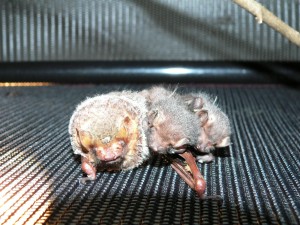Last week, the Okaloosa County Health Department issued a rabies alert after three bats were determined to have the illness. A “drive-through” rabies vaccine clinic was organized for pets, and warnings were issued throughout the region about making contact with wild animals. One radio broadcast played an interview in which a health department staffer urged people “not to attract wildlife to your yard.” While they were focusing on unsecured trash and pet food, I found this advice unsettling, for as an Extension Agent I’ve promoted the practice of attracting wildlife to yards for many years—birds, butterflies, and even (especially) bats. Raccoons, not bats, have the greatest incidence of rabies (based on data collected from 1992-2011), by a factor of almost seven times that of bats. In the scare of a rabies outbreak, it can be easy to overreact or overlook the many benefits that wildlife provide to our neighborhoods.
There are, of course, practical ways to go about living with wildlife without endangering your health or that of your family and pets (including making sure pets have the rabies vaccine).
Use Caution around Injured Wildlife
Most wildlife rescue organizations do not have the staff to pick up injured animals and ask those who find one to bring them in. However, sick or injured animals may respond aggressively as an intuitive protective measure. If you are taking an animal to a wildlife rehabilitator, be sure to approach it gently and use a blanket or large towel to pick up the animal, and place it gently in a box with a ventilated lid. Great information on responding to injured or deserted animals can be found at the Wildlife Sanctuary of Northwest Florida website. Keep in mind that bats are flying animals and spend almost no time on the ground. They do not chase people and are primarily concerned with catching insect prey. If you find a bat on the ground, it is most likely sick. County animal control or private wildlife responders can also help if you are concerned about interacting with a sick animal.

Use Care When Retrieving Dead Animals
When bird flu, West Nile or rabies hits an area, health departments sometimes ask that suspect animals be reported for testing to confirm the cause of death. Even if you are just disposing of the animal, be sure to use gloves and place the animal in a sealable plastic bag to prevent spreading germs, and wash your hands after handling it. If burying, place at least three feet deep and away from wells or water sources.
Enjoy Wildlife from a Distance
Disturbing healthy animals while they are feeding or resting can cause unnecessary stress and reduce their hunting success. Animals’ natural behaviors are fascinating to watch, so be sure and do so from a respectful distance to allow them to interact normally with their environment.
 0
0
